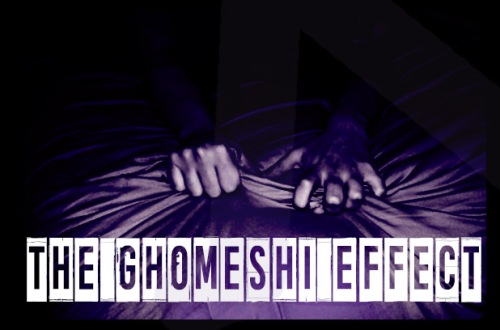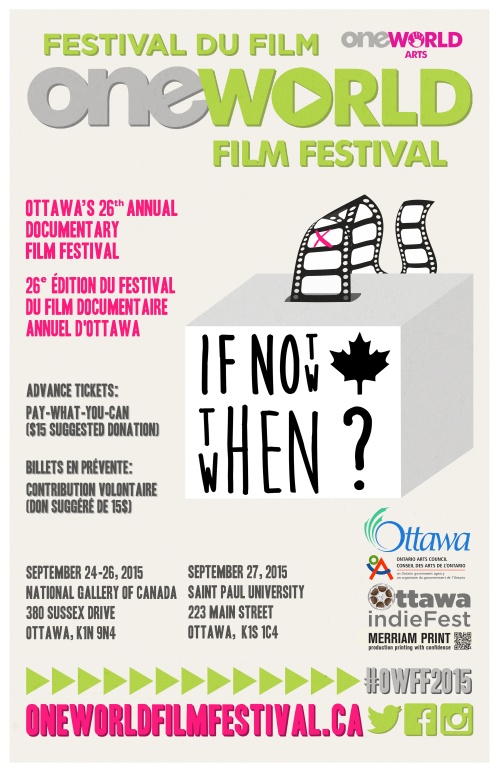Today my friend and colleague Kat Fournier and I launched the very first episode of Just Another Gala: Your Ottawa Theatre Podcast. Ottawa’s theatre scene has exploded in the last few years, and we feel that some thorough on-air discussion is in order. Join us!
We’re also on Facebook and Twitter. Please like and share widely.
Posted in Dance, Festivals, Ottawa, Theatre | Tagged Arthur Milner, arts court, Betroffenheit, canada, electric company theatre, Just Another Gala, national arts centre, Ottawa, Ottawa arts, Ottawa Fringe, ottawa theatre, Patrick Gauthier, podcast, Sarah Waisvisz, the gladstone, Theatre, undercurrents festival | Leave a Comment »
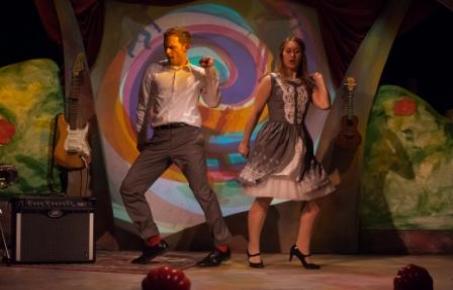
Last week I attended the opening performance of Matchstick at the Great Canadian Theatre Company, and I haven’t been able to stop thinking about it. Although there is plenty to say about the production, there is an aspect of the play that stood out for me more than anything else, and no one so far seems to have touched on it in writing – though I have had a few conversations with fellow theatre goers that reassure me that my reaction was not unique.
Matchstick is a folk musical about a young orphan girl in an ‘undesirable country’, who eventually grows up, finds love, and moves with her new husband – not as lovely as he first seems – to the ‘land of opportunity’. Straight-forward enough.
Now the thing about this play, and one of the reasons why it seems to have done so well on the Fringe circuit (notably Ottawa Fringe 2013) and beyond, is that it has a very curious twist that some people may register early on, and others closer to the end of the piece. It highlights a historical moment in time that most of us will recognize, and I won’t make an enemy of the creators by revealing what that moment is.
I will say that at the point at which I understood the twist, I found myself feeling very aggravated. For one simple reason: the twist is that this woman’s story is eventually revealed to be a story centred on a man.
Perhaps you’re wondering why this is so important. Plainly speaking, I don’t see and hear enough stories about women. And this particular story was at first exploring some interesting ideas from the woman’s perspective surrounding domestic abuse*, immigration, language development, relationship expectations, child rearing, and striving for independence despite challenging and gendered circumstances. But for me, all these efforts to incite empathy for and interest in the central female character were negated by the fact that we, the audience, are supposed to be deeply affected by the revelation that her story is being told, arguably, for the sake of referencing a male historical figure.
Conversely, it could be debated that regardless of how the play ended, the majority of its content did still focus on the life and thoughts of this woman. But then my question would be, Why wasn’t that enough? Did the story require an extra special male-focused something to make it more stimulating? Or maybe the production was, in fact, highlighting the fact that women’s stories frequently get lost in history (rather than ‘herstory’) in favour of the male experience and perspective. But then, I don’t believe that was made explicit.
Either way, I would like to see female characters own the stories they deserve. Because there is so much I want to learn from them.
*One lyric stuck with me: “I spent New Year’s Eve in a bathtub / Because I married a crocodile / He dragged me into his home / No, I came on my own.” What a perfect way to capture the shame, guilt, depression, and anger that comes with domestic abuse.
Posted in Theatre | Leave a Comment »
Don’t miss the 26th annual One World Film Festival at the National Gallery of Canada from September 24 to 27, 2015. This is my first year as Festival Manager, and I’m absolutely thrilled to be presenting a wide-range of local and international documentary films that will inspire you to make informed choices about Canada’s future. With an important federal election coming up, this is hardly the time to be apolitical! Pay-what-you-can tickets are on sale now.
Posted in Theatre | Tagged canada, canadavotes, documentary, election, festival, film, ifnotnowthenwhen, nationalgalleryofcanada, Ottawa, vote | Leave a Comment »
Let’s talk about this idea of community.
As artists, it is something we often seek out: to find like-minded people to share in our passions, to have not just a poetry show to attend but also a place to enjoy milkshakes together afterwards.
Community is about inclusiveness, but also exclusiveness. We say we want everyone to feel safe and welcome in our community, but in order to do so, we must restrict certain freedoms and the participation of certain people. We also have to make choices about whom to include in our community when there is a conflict between two or more people: we have to consider who benefits our community more greatly, who has earned the right to an unquestioned place in our community.
I remember you. You designed the CD cover for one of the poetry collective’s first albums. You were sweet, short, blond-haired. You volunteered at the first national poetry festival and welcomed me to the events. Then you got pregnant, and your poet boyfriend left you, and we never again saw you at those events.
I remember you. You organized showcases and women’s events. You brought passion to your work. You married a young, fiery poet for love in a ceremony that I’m sad to say I missed. You also got pregnant, your marriage fell apart, and you no longer felt welcome at those events. I’m sorry.
I remember you. You moved here from Nova Scotia, for love of another poet, and shared your sensual work onstage, and I was glad when we eventually became friends. You said you only felt welcomed by association with him, and when he left you, carelessly, you were suddenly a stranger in a place you hoped to make your home. I hope your memories are better now.
I remember myself, also. I was 19 (in 2005) when I started attending poetry events regularly. I was invited to run my own side project. I was encouraged to start performing. I was made to feel special. I was desperately in need of community, and I felt flattered when a certain poet began to take an interest in me. Even then, I recognized that he was not a good person. I had heard things, but I chose to ignore them, thinking – as long as he is good to me, that is what counts. But he wasn’t good to me. He treated me badly, both in a personal and professional capacity. He raised a hand to me once, but I stepped back in time, so I suppose I can’t officially complain about that.
My experience with him was not a positive one, and yet I do not consider myself a victim, as it was my choice to get involved with him, and I take full responsibility for that. But I am disappointed by how other people responded to what happened to me: at the time, I did report his behaviour to other people in the community, and the response was often – he just needs more love, more understanding, so we can’t give up on him… and think of how much he gives back to the community.
By the end of that very difficult year, I considered ceasing my involvement, until the final meeting when he announced that he was revoking his role as director and would no longer be attending the events. He recognized that people were not attending the events because of him and that there was tension due to his presence. I was relieved and grateful. But only for a short time, as a few months later, he was back again, welcomed back heartily, and no one seemed to remember any past wrongs. People can be so forgiving when it’s convenient to them.
In 2010, the poetry collective held a meeting to determine whether the current director would remain in his post, or if another member would assume his responsibilities. At this point, the poet in question decided to apply for the directorship. And you would not believe the turnout for that meeting: perhaps the most well-attended in collective history. Twenty-or-so poets showed up simply to vote against him. Only three people – still taken in by his goofy charm, and seeming professionalism – voted for him, insisting they could handle him despite his reputation.
I understand why people made excuses for him, and continue to do so even now when he is accused of sexual harassment and taking advantage of minors. He was, after all, one of the people responsible for starting the poetry collective in Ottawa, for hosting a multitude of community events, for tackling issues of mental health in his poetry, for being a mentor to young poets, particularly in launching a youth poetry slam. (On a side note, who in their right mind allowed this person to receive funding for a YOUTH poetry slam?) And just last year, he was included in a ‘hall of fame’ for his contributions to the poetry community. How can you fault someone who seems to do so much good for the community to which they belong?
The question we need to ask, perhaps, is what these people gain from being in a leadership role. In this case, this particular poet gained for himself immunity from taking responsibility for his actions. His seemingly small faults could be excused because of the persona he chose to project within his community: one of social awareness, human compassion, and encouraging the youth of today. Artists and leaders who preach these things can be some of the best people around, or they can be some of the worst. It can be difficult for us to wrap our heads around this hypocrisy, to recognize that people who purport such ideals – “especially people who care about strangers, who care about evil and social injustice” – can be so carelessly wretched to those who love them, look up to them, and work alongside them.
This poet is now being banned from poetry events across the country; his features are being canceled; he is being reported to the school board; his name is being held up as an ‘example’. An example of what? Of someone who got away with this type of bad behaviour for ten whole years, possibly more? If I were a young predator – since now it seems fashionable to use this word – I would consider this a success story: indeed, I could get away with the exact same behaviour for over a decade, especially if I’m a little more careful (I can learn from his mistakes!) about not getting caught.
Let me be clear: I am beyond grateful to the people who are now speaking out and making an effort to make amends. I think they are doing absolutely the right thing, and I applaud them. But I think we also need to consider how this might have been prevented, or dealt with earlier. And how we can better handle the next generation of so-called predators, disguised as mentors, colleagues, and friends.
All those poets who attended the poetry collective meeting simply to vote against him, you must have done so for a reason. But did you ever speak out against him, or did let your anonymous vote speak for you?
I spoke out at one time, but I should have spoken louder and more frequently. I gave up and I quieted down because, frankly, I wanted my community. I still do. I didn’t want to be yet another young woman pushed out of the community because I couldn’t stand to be in the same room as a man who treated me badly and treated others worse.
Especially in the arts, there is this liberal-minded attitude that artists can get away with all types of bad behaviour because they are artists. As though carelessness and fiery moods and sexual aggressiveness are all part of the artistic temperament, inherently. I assure you, they are not.
There are many other people like him out there. Poets in Vancouver created a blog about it a few years back, sharing their experiences of being harassed, assaulted, and misused, then ignored or shamed by their community when they tried to say something about it. Of course, the names of the abusers were never included because that would constitute ‘defamation of character’ – at least until the culprit is publicly deemed dangerous by an organization (rather than a number of individuals), and then we can say their name all we want.
Funny how, technically and legally, I could have used ‘his’ name throughout this article, and yet my gut instinct told me not to. Perhaps because, really, this isn’t about him. This is about a community that supports and excuses and sometimes even defends people like him. To be clear, I don’t like the guy, and I’m certainly not sorry to see him being held accountable in this way – but I also don’t want to see him reduced to a scapegoat for a community whose problems are far bigger than one bad egg.
As cynical as it may sound, perhaps the first step toward positive change is recognizing that ‘community’ is not always what it may seem. We may feel the temptation to involve ourselves wholeheartedly, embracing the warm feelings associated with having a group to which we belong, and, in doing so, fail to step outside the inner circle to acknowledge the problems inherent therein. At least, that has, I think, been my predominant weakness in my ongoing search for community. Perhaps it is a little foolish, but ‘community’ is still something I idealize and strive for in all aspects of my life, so I do understand where that feeling comes from, and why it is so important.
And let’s also remember and acknowledge those people who once belonged to our community and who, for whatever reason, were made to feel excluded or felt obligated to leave: I’m sorry for what happened; I’m sorry we didn’t do more to help; and I hope you found joy in community elsewhere.
We’ll do better next time.
Posted in Theatre | Tagged canada, capital poetry collective, community, Ottawa, sexual abuse, sexual harassment, spoken word | 11 Comments »
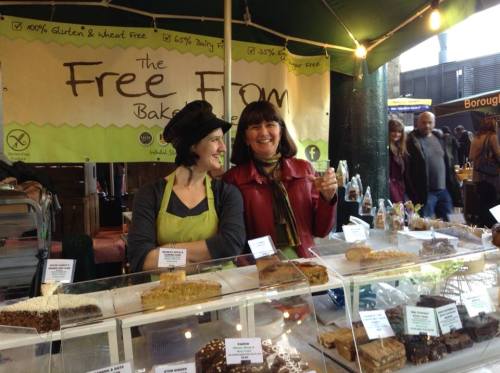
My Mum visiting me at work. I had to tell her off for drinking on the job.
Man, I’m going to miss the Borough Market.
Seriously, folks, if you’re seeking a community that exemplifies affability and togetherness, ultimately void of pretension and egos, and full of vibrant characters that would and should be featured in the world’s quirkiest sitcom, you needn’t look any further.
Sure, it’s difficult getting out of bed early in the morning, but as soon as I arrive on site, I’m greeted by a chorus of hellos and smiling albeit sleepy faces, and soon enough I’m dancing to the tunes from Paul the fisherman’s speakers, and chatting with the cereal girls, and saluting my Mexi-Moroccan market soulmate, and opening boxes radiating deliciousness ready to be shared with the many wonderful people from around the world that I have the pleasure of meeting each day.
My lower back hurts, but my heart is full. A million times, thank you x
Posted in Theatre | Leave a Comment »
Two travellers wander down a street in Japan. They are searching for an ‘anago’ (salt-water eel) restaurant.
Jestragon: (despairingly): You’re sure it was here?
Roydimir: What?
Jestragon: That we were to wait.
Roydimir: The book said it was down this street. (pause) What are you insinuating? That we’ve come to the wrong place?
Jestragon: It should be here.
Roydimir: It didn’t even say for sure that we could get in.
Jestragon: And if we can’t get in?
Roydimir: We’ll come back tomorrow.
Jestragon: And then the day after tomorrow.
Roydimir: Possibly.
Jestragon: And so on.
Roydimir: The point is –
Jestragon: Until we can get in.
Roydimir and Jestragon eventually find the anago restaurant with a small gathering of strangers sitting outside. No one speaks. They are all waiting to get in. There is a glass case that displays anago model dishes, but no actual food. There is tea, but no one touches the tea. There is a list where everyone writes down their names. Soon the hostess comes out of the restaurant and checks the list, takes orders from the door, and then disappears again inside the restaurant. When one stranger attempts to enter the restaurant, he is pushed out and told to continue waiting. Everyone continues waiting for over an hour (i.e. one act).
Jestragon: Let’s go.
Roydimir: We can’t.
Jestragon: Why not?
Roydimir: We’re waiting for Anago.
Posted in Theatre | Leave a Comment »
Train ride on our way somewhere: we sit opposite a Japanese mother with a young girl and a baby boy.
The young girl – maybe 5 or 6 – watches us as we chatter away, as usual. She smiles.
‘She likes you,’ I say to him. ‘She’s looking at you.’
He smiles back and waves at her. She beams.
‘Shall we make her day?’ I ask, as I reveal to him a clown nose in my little blue purse.
‘Go for it,’ he says.
So I put on the clown nose, and he and I engage in a strange little exchange, throwing around noises and words, gestures and movements, facing toward, facing away to the window and back again. We are exhilarated. We are exasperated. We are arguing. We are agreeing. We are joining hands. We are making plans. We are rolling eyes and spitting sounds and holding our breath and taking breaks and taking chances and trying things out. And she is watching.
It’s our stop. We get up from our seats, and I remove my clown nose as we head toward the door.
‘Look,’ he says. And the young girl and her mother and her baby brother have turned around in their seats and they are so joyful. We exit the train and watch them from the window. They wave goodbye.
‘That was your professional Japanese clowning debut,’ he says.
‘Wonderful,’ I say. And the day continues.
Posted in Theatre | 3 Comments »
We never did get to go whale watching.
That’s the big thing in Okinawa. Someone takes you out in their boat for 2, or 4, or 6 hours (the full 6 hours recommended, of course) and you find yourself surrounded by whales. One time, one of our hosts said, she went out and followed a mother and her baby whale through the ocean waves, and that even the anticipation of the experience is addictive. There are posters of whales in the B&B-style hotel, and souvenir whale t-shirts and magnets and stuffed animals; at the wharf where the boats dock, there are flowers arranged in a whale design.

Yes, that is a heart on the wing.
From the airport we took a sky train, and from the sky train we took a 2-hour ferry to arrive at the island Zamami where our two hosts – one Japanese lady who owned the house where we were staying, and one Polish woman who was there helping her – waited for us with a welcome sign. Royce had stayed here before, and so was greeted warmly when the Japanese owner remembered who he was. ‘Your mother gave me a bear’ she recollected happily. A little jeweled bear in a small velvet bag, she showed us later, having kept it safe since the last visit.
Our room, like the one in Tokyo, is lined with Tatami mats and contains only a small table and a mini fridge. In one of the closets is all our bedding: mattresses and sheets and blankets and pillows. Because of the mats on the floor, you don’t need anything more than that. And when you’re not using the beds, you are welcome to put them away and have the entire floor space to yourself. Such a clever idea that really should be implemented for London flats where there is never enough space.
Our hosts offer us breakfast for the three mornings that we will be staying here: ‘Come down for 8:30!’ they add cheerily, following our hasty acceptance. We look at each other: we had not intended to be morning people on this particular trip, but we’re also the type of people afraid of causing offence, so we keep our humourous panic to ourselves and rationalise that, hey, we can always return to our room right afterward.
This is a small, intimate neigbourhood. No one locks their doors, and no one worries. There is one school, one proper restaurant, and one grocery shop. There is also a karaoke bar, but we don’t venture there. Throughout the day, muffled happy (though also strangely sinister) songs play from a loudspeaker; one sounds like a school bell, but it plays at all hours of the day, and even on Saturdays. There are two climbing trees in the school yard and I climb both of them with enthusiasm, thinking to myself ‘I promise I will never be too old to climb trees or sit on the floor at train stations.’
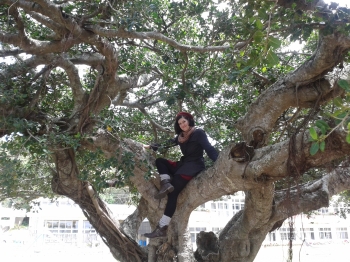
I love my tree.
Our first real adventure takes place the following evening when we attempt to journey to one of the two beaches on the island. Up the road, I notice an opening through the trees and said aloud ‘I wonder where this path goes.’ One of the many wonderful things about my companion (and a quality that I would very much like to adopt) is that he doesn’t mind straying from the planned route when a potentially exciting new opportunity arises. ‘Let’s go find out,’ he says, and we wander through the bushes, up an earthy set of stairs made a more feasible climb with the help of a railing, up to a clearing in the woods – the perfect camping site – and farther along, a beautiful view of the entire neighbourhood, with the ocean stretching out before us, as far as we can see, showcasing islands bordered with starlight. Behind the clearing a shadowed shrine with a marbled wall listing numerous names; perhaps the names of soldiers and families lost in the war.
We continue uphill for some time, until we reach a turning that we think might lead to the beach. Instead we find ourselves walking down a winding steep road into another residential area with which we are not familiar. Even though it is still early evening, no one is wandering outside of their houses. This appears a well-lit ghost town, the only movement from cats protecting their temples and birds protecting their nests. It is soothing to feel completely alone in the quiet, like the island belongs to us.
On the way back, we witness the most extraordinary sight: a collective of women behind floor-length glass windows rehearsing a Noh Theatre performance. They perform several dances in costume with multiple props, including these spectacular gold fans. Royce tells me that the last time he visited this island he actively searched for this type of performance to attend, and here we were, serendipitously viewing from mere yards away one of Japan’s oldest theatrical traditions. Breathtaking.
The next day, we do actually go to the beach. ‘Don’t try swimming in the water, though,’ he told me. ‘Last time I was here, the owner took me on a two hour boat ride and forced me to look underwater with goggles at all the poisonous snakes and eels and sharks and other things that could potentially kill me.’ ‘But they wouldn’t be in the shallow part of the water, would they?’ I pressed, keen to make use of my new bathing suit. He returned with this look that said, don’t make me say I told you so! But with the mid-afternoon sun beating down on my slowly reddening skin and the feeling of warm sand under my feet and between my toes, I couldn’t resist dashing calf-deep into the water, lifting my skirt when a wave came crashing by. And much to my relief, I survive this audacious act with all my limbs in tact.
There’s a slowness here. One that permits me to spend an uninterrupted amount of time watching to see if a community of hermit crabs will emerge from their shells for my own amusement. That encourages me to climb over steep, dark rocks beautifully misshapen by the tide rolling in, collect and admire and treasure brightly-coloured coral and shells from the sand, and twist a not-yet-ripe yellow-and-green pineapple from its own squealing maternal branch. Hours pass unnoticed and one fishing boat passes by; a handful of locals can be seen browsing the beach.
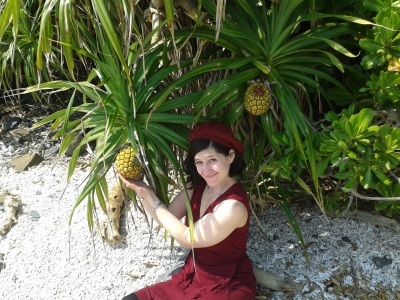
A pineapple…. for me!
When I was younger and camping with my family, I used to wander off and find myself a large rock by the water on which to seat myself and write in my journal. Goodness knows what I wrote about, and whether or not my surroundings served as an environmental muse, but simply being there inspired this sense of calm and remove that I rarely find now living in the city and worrying about how much or how little I’ve accomplished day-to-day. There, my only purpose was to find my rock and sit on it and write. Here, it was to stare out into ocean and think about nothing beyond my surroundings. For once, that wasn’t difficult.
We never did get to go whale watching. The weather simply wasn’t clear enough, and our guide hadn’t been able to return by boat in time to take us out. But no matter; there’s always next time.
Posted in Theatre | Leave a Comment »
